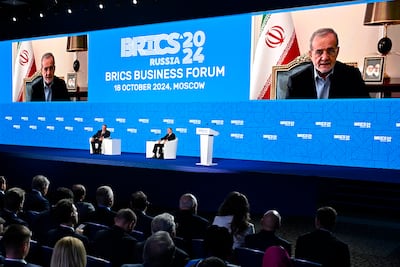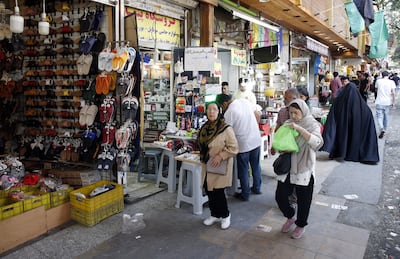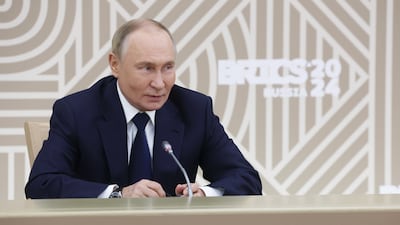Brics leaders on Friday called for greater cross-border investments and deeper co-operation between member countries amid geopolitical challenges, ahead of a key gathering next week.
The 16th Brics summit will be held in Kazan, Russia, from October 22 to 24. It will be the first since Saudi Arabia, Iran, Egypt, Ethiopia and the UAE joined the economic grouping on January 1.
Russian President Vladimir Putin said that Brics countries will generate most of the global economic growth in the next few years, thanks to their dominance in key markets such as energy, metals and food.
Brics' share of global GDP “strongly exceeds” that of the G7 group of advanced economies and continues to grow, Mr Putin said during the Brics Business Forum in Moscow.
“This year, average economic growth rate of Brics is estimated at 4 per cent, which exceeds the growth rate of G7 countries [at 1.7 per cent] and the [global] growth rate of 3.2 per cent,” he said.
Brics, founded in 2009, was formed to represent the interests of major developing economies. The organisation, which was founded by Brazil, Russia, India, China and South Africa, seeks to enhance economic co-operation among its members.
“The companies [from] Brics countries dominate many key markets, including energy, metals and food…without which sustainable economic development is impossible,” Mr Putin said.

The meeting comes as the Russia-Ukraine war continues with no immediate signs of a peaceful resolution.
Meanwhile, the Gaza war has intensified into a regional conflict, with Israel launching a ground offensive in Lebanon. Israel is currently thought to be preparing a response to Iran’s ballistic missile attack on October 1.
The world is witnessing “challenges and crises” that require joint efforts from all countries, Egyptian President Abdel Fattah El Sisi said.
“Not only do we need to provide swift solutions to modern challenges, we also [need to view] sustainable development as our shared responsibility,” Mr El Sisi said.
“Brics [involves] the private sector and businesses, who are indispensable partners in this field. Therefore, this forum offers a new platform for such co-operation. It makes it possible for us to jointly explore various fields of investment activities and trade between member states,” he added.
Egypt, the Arab world’s third-largest economy, has introduced several economic reforms aimed at improving the country’s investment climate, Mr El Sisi said.
The government is working to make it easier for businesses to operate and reduce the complexity of the tax systems, but “bureaucracy is still painfully felt in Egypt”, he added.
Egypt's economy has faced several challenges in recent years, including high debt levels, inflation and a foreign exchange shortage.
The war in Gaza and its regional repercussions have also been a major driving force behind Egypt’s sluggish growth throughout the first half of 2024.
Brics creates the basis for “expanding mutual trade” and has a “good influence” on international affairs, Iranian President Masoud Pezeshkian said.
Mr Pezeshkian bemoaned international sanctions against his country, calling them “illegitimate” and in violation of human rights.
The US dollar is being used as an instrument to “weaken” the position of some countries in the world, he said. “Fortunately, countries have established the necessary co-operation to use other currencies, and this process is continuing.”
Among the main priorities of Brics is the creation of a common currency, aimed at challenging the dominance of the dollar and dethroning it as the international reserve currency.
Sanctions were reinstated on Tehran after the US withdrew from the Iran nuclear deal in 2018. However, enforcement was eased once President Joe Biden took office in 2021, enabling Tehran to significantly boost its crude oil exports - its main source of revenue - especially to China.

This month, the US expanded sanctions on Iran’s petroleum and petrochemical sectors in response to Iran’s second direct attack on Israel this year.
“The use of sanctions has a negative effect on human rights, and it was condemned by Brics countries…and they called for [a] suspension of such unilateral actions,” Mr Pezeshkian said.
“[Sanctions] could have a psychological negative impact on [countries] and it could deprive them of the opportunity to develop trade freely.”

